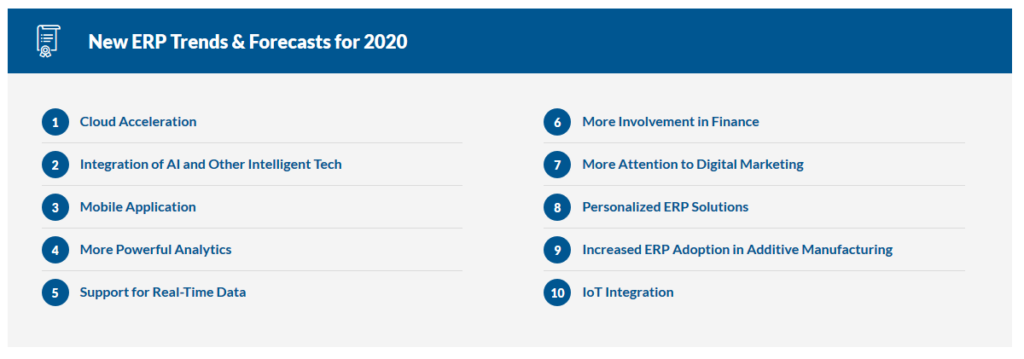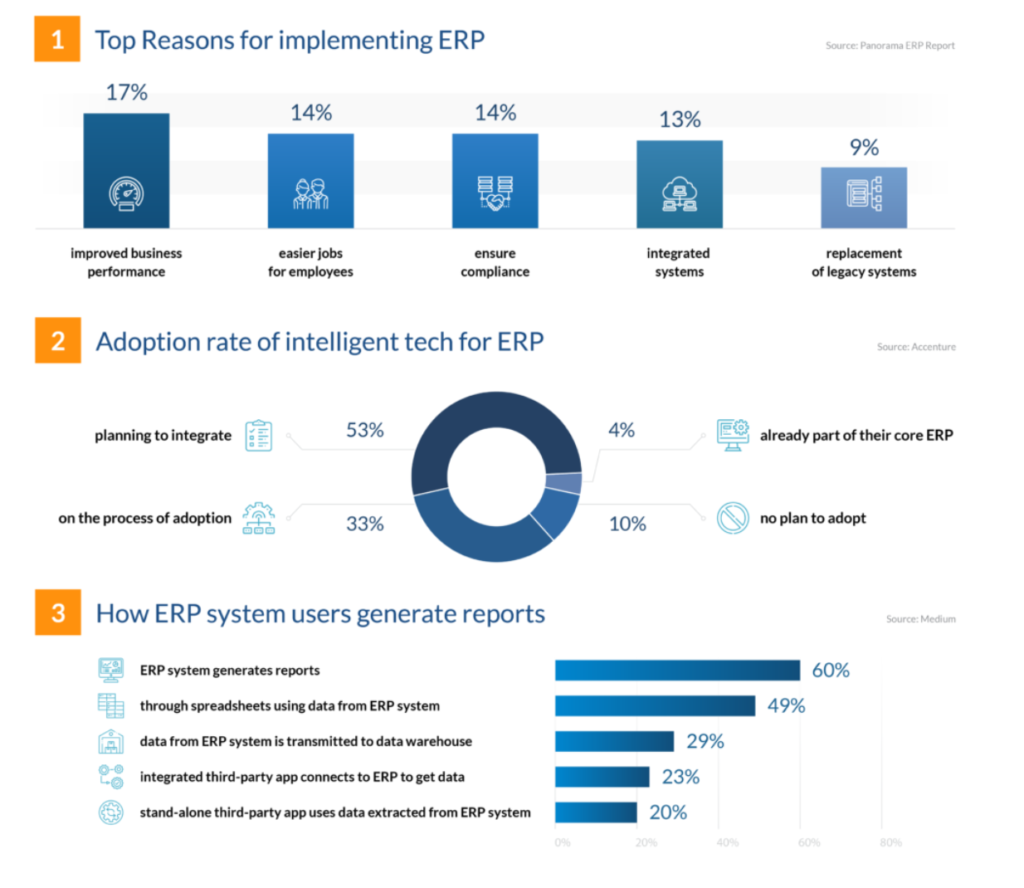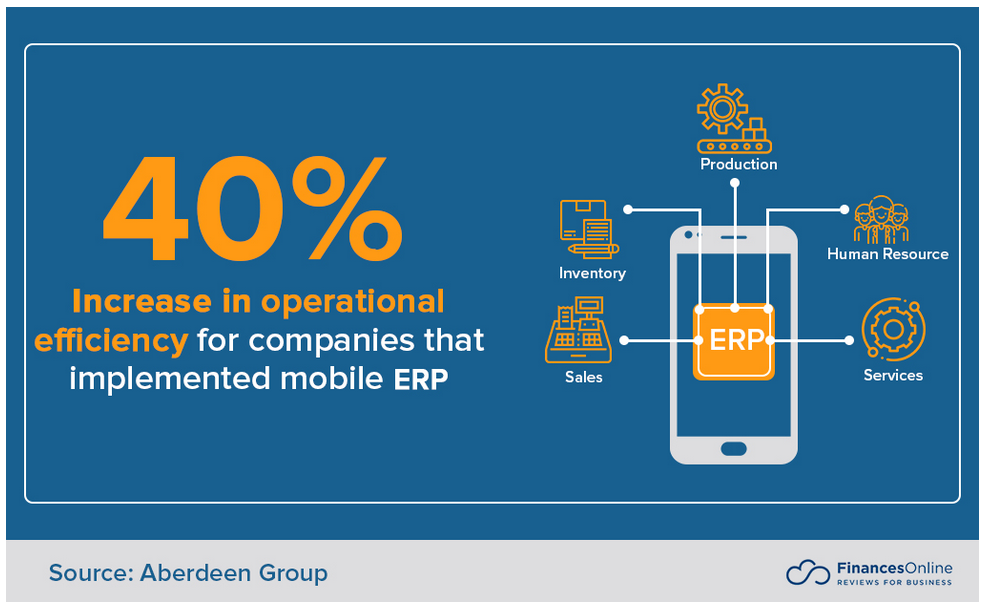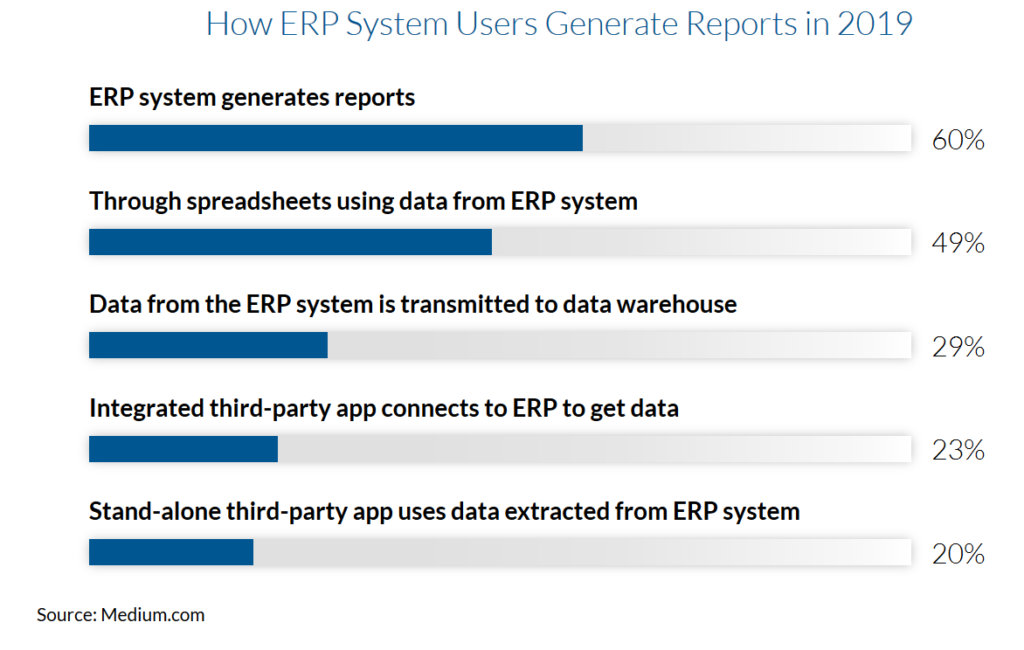10 majandustarkvara (ERP) trendi ja ennustust aastaks 2020 (inglise keeles)
Source: financesonline.com
In the modern age, people won’t let inflexible system solutions get in the way of holistic digital transformation. This is true for most of them, including enterprise resource planning or ERP software. In this light, keeping up with the latest ERP trends is beneficial to consumers and service providers alike.
Our collection of ERP statistics shows that the market for these tools is growing, adoption is increasing, and innovation is slowly but surely happening. The first few years in ERP innovation were dedicated almost exclusively to moving the solutions to the cloud. In recent years, however, exciting trends have been popping up in the field.
This article will present some of the most relevant ERP trends. Some have been gaining momentum for years, while others are still in their early stages.
ERP software has been around for some time. However, it has undergone so many changes that the older versions are now called legacy systems. These platforms served companies well, particularly enterprises. However, times have changed and trends appear to be favoring modernization.
Spreadsheet dependence, siloed information, and security limitations are just some of the disadvantages of legacy ERP systems. This made ERP software unappealing to most modern businesses. And that’s unfortunate because there are many good reasons to implement them, some of which are shown in the chart below.
Top Reasons for Implementing ERP
Good thing modern technologies have reached the field, resulting in digital transformation. Unsurprisingly, this was followed by continuous innovation where trends shift from one area to another. Let’s look at some of them.
Cloud Acceleration
Using cloud-based ERP software isn’t exactly the latest trend, but it’s one of the most game-changing ones. In the past, ERP applications are only offered as on-premise solutions with startup fees and hardware costs. As a result, they can be too expensive for smaller businesses.
With the emergence of cloud computing, more vendors are now offering cloud-hosted options that make ERP solutions more accessible to SMBs. With these systems, users no longer have to worry about expensive system maintenance and upgrades. Moreover, they can choose to avail only the modules that they require, giving them more control over their budgets.
Because of the success of cloud adoption, SaaS ERP solutions are now dominating the market. Many companies who are using on-premises ERP are realizing their limitations, including inflexibility, costly scaling, and lack of innovation. Thus, more businesses are predicted to invest in cloud ERP in the foreseeable future.
However, ERP’s use of the cloud doesn’t stop there. There’s a growing number of businesses that are also opting for hybrid ERP solutions. According to Accenture’s 2019 ERP Trends, while 51% of chief information officers (CIOs) prefer cloud ERP and 35% use on-premise solutions, 10% of companies now use hybrid ERP tools and it’s set to grow in the coming years.
This type of system combines the strengths of on-premises and cloud-based ERP while covering for each other’s weaknesses. As a result, it has become ideal for businesses whose main focus lies in products and assets. This includes the companies in digital media and business service industries, among many others.
Integration of AI and Other Intelligent Tech
Artificial Intelligence (AI) has been the talk in the ERP industry for a few years now. Typically, users have to install separate add-ons to their systems to enjoy the benefits of automation and intelligence. However, it is becoming increasingly common these days for ERP solutions to have such functionalities built-in.
ERP with intelligence tech integration is also known as iERP. It provides companies with a significant edge through innovative data processing. Transforming business data into actionable insights is just the beginning.
There are more data than ever for companies to collect. It’s not just the amount that spiked but also their complexity. There’s only so much unstructured data that businesses need to get a rein on. Therefore, companies need to find new ways of analyzing data if they want to make full use of it. This is where AI-driven ERP software comes in.
Intelligent ERP solutions can also create workflows, reduce errors, lessen information loading time, and more. It can automate hours’ worth of routine processes. This frees some of your employees’ time, which they can use on more valuable work.
Intelligent ERP solutions can also analyze your historical data and combine it with information from other departments. The system can then suggest more effective ways of executing your internal processes. Overall, AI and other intelligent techs, when combined with ERP, can improve your business’ productivity, efficiency, and bottom line.
Mobile Application
Mobility was once an “extra” feature, but by today’s standards, it’s more of a fixture. Gone are the days when a solution is tied to a single machine. Complete mobile support will be one of the basic functionalities of a modern ERP tool.
Aside from on-the-go access to data, the mobile approach in ERP brings a plethora of benefits. One of the most obvious being its capability to perform business operations anytime and anywhere. This means that both back-end and front-end activities are available on mobile devices such as tablets and smartphones.
Its implication on overall productivity is great. For instance, employees working outside office hours can close deals even from home. That’s because they have access to all the information and tools they need through their mobile devices.
Mobility also means having a more accurate and convenient data capture process. Staff can gather and key-in information straight from the field. This removes the need to wait for them to return to the office and enter data.
Mobile ERP also lessens the risk of production delay because of better communication. For example, if there’s a materials delivery issue, the manufacturing process would be put on hold. But if it was communicated in real-time, then measures can be made to avoid or at least minimize losses.
Companies can also take advantage of other benefits of using mobile ERP. These include quicker decision-making, better workflow, and enhanced efficiency.
More Powerful Analytics
ERP systems have always been great in terms of collecting and organizing data. Not as good, however, when it comes to reporting and analysis. But that’s old news because modern ERP systems are now natively equipped with powerful data analytics features. This is mostly because companies are prioritizing the ability to make data-driven decisions quickly.
Right now, most businesses are enjoying ERP systems with integrated analytics, ad-hoc reporting, and data visualization capabilities. This provides them access to relevant information in real-time. Companies use it then to make essential business decisions regarding finances or other business aspects. As a result, decision making is now available at all levels, from the manufacturing division up to the executives.
Going forward, ERP users can be excited about more robust analytics and reporting capabilities. The future of ERP points to an end-to-end tool that can process both structured and unstructured data. This signifies that another process that ERP managers will need to focus on is learning how to leverage big data analytics.
ERP solutions will have access to all data from various departments. Therefore, they have every information necessary to predict future trends. This makes predictive analysis a strong suit of modern ERP platforms.
Support for Real-Time Data
Access to real-time data provides a lot of benefits to companies. These include more precise insights, smoother business operations, better customer service, and more. Therefore, it’s not surprising that ERP systems are making it part of their core capabilities.
A smart business decision relies on timely and accurate information. Thus, ERP systems are giving more attention to providing businesses with a means to obtain reliable information in real-time. With this, the management is given greater visibility into data from varying sources and departments. This usually spells the difference between success and failure in decision-making.
More than just providing metrics, real-time information can also help in maintaining a smooth business operation. ERP is a congregation of various tools used by multiple departments. This means that it’s in a perfect position to seamlessly communicate all relevant data across all departments.
ERP solutions can also complement fairly new technologies. For instance, the adoption of 3D printing laid the foundation for new manufacturing ERP trends. Bigger and more complex 3D printers allow manufacturers to cut down on costs and enhance efficiency in their processes. However, it requires a plethora of data to process and interconnect. This is where ERP systems excel.
Another significant benefit of real-time data in ERP is its ability to enhance the customer experience. CRM software, when integrated into an ERP system, can give you access to a series of useful customer-related information. Your customer service personnel will be armed with purchase histories, habits, and other significant details. This will yield a better chance of increasing sales, engagement levels, and retention rates.
More Involvement in Finance
The financial module is deemed as one of the most valuable aspects of the modern ERP system. It provides finance-related functionalities such as general ledger, currency management, payroll management, fixed assets, cash management, and more. It’s also responsible for producing financial reports for various departments.
Those were just the essential services that ERP gives to the finance and accounting teams of a business. In recent years, however, the financial module is getting more involved in both internal and external processes within companies. For instance, it records every transaction and integrates them with other modules to calculate the impact of particular spending.
Nonetheless, one of the major reasons why ERP’s role in finance is evolving is its access to more powerful analytics. Built-in or add-on, modern ERP solutions’ analytics empowers quick decision making and plan execution. It allows accounting, finance, and planning departments to rapidly and effectively respond to any situations and adapt to operational changes.
Finance professionals deeply show interest in the innovation that ERP systems provide, particularly in the area of analytics. Thanks to this, ERP solutions are continually improving their data analytics to deliver faster and more powerful service.
More Attention to Digital Marketing
In the modern age, people won’t let inflexible system solutions get in the way of holistic digital transformation. This is true for most of them, including enterprise resource planning or ERP software. In this light, keeping up with the latest ERP trends is beneficial to consumers and service providers alike.
Our collection of ERP statistics shows that the market for these tools is growing, adoption is increasing, and innovation is slowly but surely happening. The first few years in ERP innovation were dedicated almost exclusively to moving the solutions to the cloud. In recent years, however, exciting trends have been popping up in the field.
This article will present some of the most relevant ERP trends. Some have been gaining momentum for years, while others are still in their early stages.




